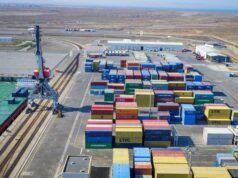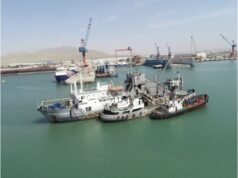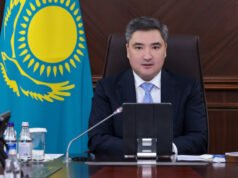Russia has launched laying of deep-water part of the Turkish Stream pipeline in the Black Sea.
Russian President Vladimir Putin gave a symbolic start to the process of joining the shallow and deep-water parts of the Turkish Stream gas pipeline from Pioneering Spirit pipe-laying vessel, Kremlin’s press-service reported on June 23.
The Turkish Stream is an alternative route for Russian gas supplies to Turkey and further to Europe. Russia and Turkey signed an intergovernmental agreement on the implementation of the Turkish Stream project in October 2016.
President Putin held phone talks with his Turkish counterpart Recep Tayyip Erdogan aboard the installation vessel, informing him that pipe-laying work has started at the Turkish Stream pipeline’s deep-water section.
“Our projects with Turkey are developing the way they are not developing with many other partners,” Putin said. “Where we spend years with different countries on various administrative approvals, with Turkey this is done in several months and undoubtedly happens as a result of your direct personal support.”
Putin also expressed confidence that it would be possible to meet the construction deadlines for the Akkuyu nuclear power plant.
He thanked Erdogan for the Turkish regulator granting a license for the Russian operator.
“If we continue moving in this pace with the work on other issues, we shall definitely fulfill the plans, in particular, will introduce the first NPP unit by the deadline,” the Russian president said.
Chief Executive Officer of Gazprom Alexei Miller, who also took part in the event, said that the negotiations between Gazprom and European partners on extending the Turkish Stream gas pipeline in Europe stipulate no exclusive terms while the Russian energy giant is receiving proposals on the routes of laying the pipe.
“At present, there are proposals on the route of laying the pipe but there is no exclusiveness. The preliminary agreements with the interested companies have been signed and therefore, the work will be continued,” Miller said in a live broadcast of the Rossiya-24 TV Channel, TASS reported.
“The requirements for gas in Europe are increasing today and “the Turkish Stream will undoubtedly ensure the reliability of gas supplies to these countries,” he said.
Turkish Stream gas pipeline was announced in December 2014. Russia and Turkey signed an inter-governmental agreement on October 10, 2016 on the Turkish Stream, which envisages the construction of a gas pipeline along the seabed of the Black Sea to Turkey’s European part and further on to the border with Greece.
The first stretch will be intended for the Turkish market and the second will supply natural gas to countries of South and Southeast Europe. Each stretch will have a capacity of 15.75 billion cubic meters of natural gas annually. The pipeline is expected to annually pump 31.5 billion cubic meters of natural gas.
Gazprom launched the construction of the Turkish Stream gas pipeline’s offshore section near the Russian coast of the Black Sea on May 7.






